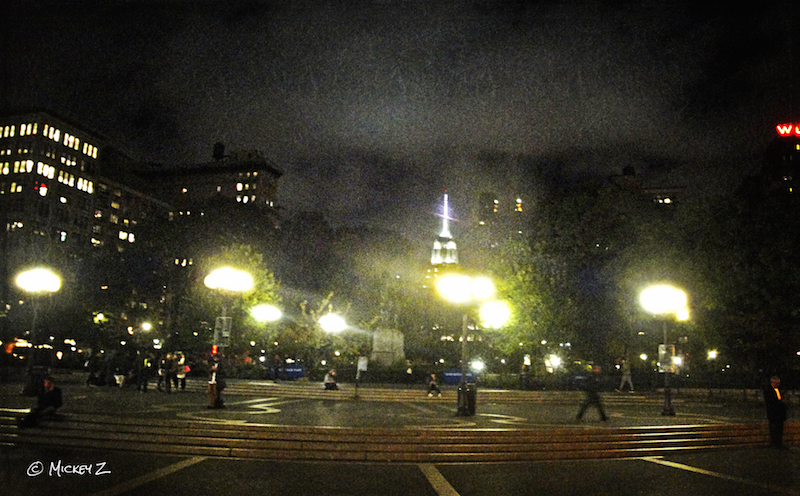Modern Life, Light Pollution, & Fear Of The Dark
By Mickey Z.
04 June, 2015
World News Trust
“And God said, Let there be light: and there was light./And God saw the light, that it was good: and God divided the light from the darkness.” (Genesis 1:3-5)
“Hello darkness, my old friend.” (Simon and Garfunkel)
Every now and then, I’m asked some variation of this question: When were you most awed by nature? Like most of you, I have a handful of examples to choose from… but the answer I usually settle on involves gazing at the night sky in a very rural Vermont town.
I had never witnessed that many visible stars in my life and -- being a heavily conditioned modern urban dweller -- I promptly bellowed something like: “Wow, it looks like the Hayden Planetarium!”
(insert sad trombone here)
A far more dramatic version of this modern malady took form in Los Angeles -- a city with a sky glow visible from an airplane 200 miles away. After an earthquake knocked out electrical power in 1994, it seems “many anxious residents called local emergency centers to report seeing a strange "giant, silvery cloud" in the dark sky. What they were really seeing -- for the first time -- was the Milky Way, long obliterated by the urban sky glow.”
(insert sad trombone here)
While perhaps some of you are well-versed in the concept and consequences of light pollution, since I’ve recently been learning and musing upon this topic, I thought I’d share some miscellaneous facts and contemplations -- with the intention of provoking further thought and conversation.
For starters, check this out: Light pollution map.
Light pollution comes in many forms, including sky glow, light trespass, glare, light clutter, and over illumination. Whichever version you encounter, make no mistake, it’s working against billions of years of light-dark regularity. Here’s how the folks at the Florida Atlantic University Astronomical Observatory describe it:
“This regularity is ingrained into the DNA of species up and down our evolutionary tree to our biological advantage. Natural light ‘entrains’ or regularizes basic and fundamental biological activities across species from plants to humans … The effects of light pollution on plants and animals in the environment are numerous and are becoming more known over time … For approximately half of all life, those crepuscular and nocturnal species that begin their daily activities at sundown, our artificial lights at night seriously constrain their lives, exposing them to predators and reducing the time they have to find food, shelter, or mates and reproduce.”
Frighteningly, the examples of such disruptions are far too numerous to detail in a short article so please allow me to highlight just one: “Nesting sea turtles, which show a natural predisposition for dark beaches, find fewer and fewer of them to nest on,” writes Verlyn Klinkenborg in National Geographic. “Their hatchlings, which gravitate toward the brighter, more reflective sea horizon, find themselves confused by artificial lighting behind the beach. In Florida alone, hatchling losses number in the hundreds of thousands every year.”
As with most contemporary “problems,” we are taught that the solution is to be found by slightly modifying our own behavior while simultaneously trusting the experts (sic) to keep things moving forward into, um… progress?
Wanna reduce light pollution? Simple: just buy blackout curtains or use outdoor lights that operate via sensors or lower the wattage of your bulbs, blah, blah, blah.
Reminder #4,411: Personal lifestyle choices are not game changers.
Light pollution is not an anomaly or a glitch in an otherwise efficient system. Light pollution and its myriad deleterious impacts are the predictable outcome of a dominant culture that is, by definition, in perpetual conflict with the natural world. Capitalism cannot be tenderly reformed into sustainability and its consequences will never be properly confronted if we don’t stop demonizing and fearing the dark.
“Civilization has fallen out of touch with night,” wrote Henry Beston in 1928. “With lights, we drive the holiness and the beauty of night back to the forests and the seas; the little villages, the crossroads even, will have none of it. Are modern folk, perhaps, afraid of the night? Do they fear the vast serenity, the mystery of infinite space, the austerity of stars?”
Mickey Z. is the author of 12 books, most recently Occupy this Book: Mickey Z. on Activism. Until the laws are changed or the power runs out, he can be found on the Web here and here. Anyone wishing to support his activist efforts can do so by making a donation here.
.
Comments are moderated


